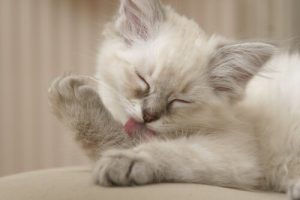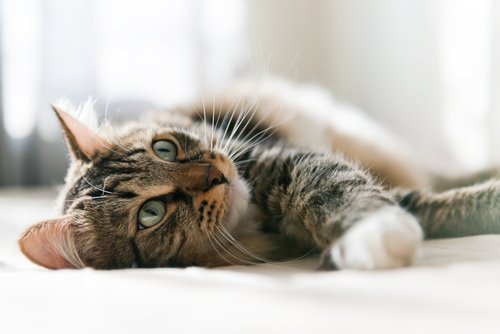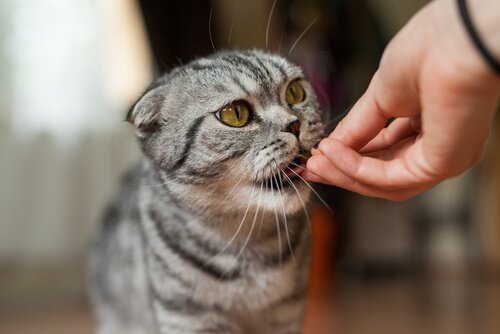Indigesting Hairballs: How to Deal with this Problem

Cats are very hygienic animals and they spend a lot of their day cleaning themselves. That’s why, even if you don’t bathe them, they’ll usually still look beautiful. But since nothing’s perfect in life, feline cleanliness also comes with negative effects. Famous hairballs can form in their digestive system and can cause indigestion.
Why do hairballs form?

Cats mostly use their tongues to groom themselves. Their tongue is an ideal instrument because it has small spines on the surface that allow it to drag out all the dead hair.
The problem is that some kittens cannot get rid of all the hair that’s left in their mouth and they end up swallowing it. Even though many of these hairs are normally eliminated through their feces, others accumulate in their digestive system. This hair then forms unusual balls, which the animal will try to get out of their body by vomiting.
If they cannot get the hair out by using this method, in severe cases, the hairballs may end up clogging his intestines, which will require surgical intervention to get rid of them.
Cats’ hairballs are a direct consequence of their long grooming sessions. The hairs that the animal swallows but cannot be eliminated through their feces are then expelled through vomit.
What do the hairballs that cats vomit look like?
Those who have cats have probably all asked the same question the first time they saw their cat cough up the hairs that were in their stomach. But why are they referred to as balls?
That’s because the so-called hairballs have an elongated shape that varies in size and color, similar to that of the cat’s fur. They are usually between three and four centimeters and remains of food and saliva are mixed in with the hair.
When the animal is trying to vomit to get the balls out, they’ll make a sound similar to a human cough. Cats normally cough up one or two hairballs a week.
How to help your cat with hairballs and avoid indigestion?
Usually, the cat will try to purge by eating herbs which will then cause them to vomit and expel the hairballs. So, if you have a garden or patio, don’t try to stop him from pouncing on the lawn or a plant. But you should take some precautions:
- Don’t use pesticides or other chemicals that could hurt your cat
- Talk to your vet about plants that may be dangerous for cats
- To keep them from destroying your garden, you should grow herbs that are suitable for your cat to eat. Again, you should ask your vet for advice.
If you live in an apartment and your cat doesn’t have access to the outdoors, you may want to grow their favorite plants in some pots inside. You can also buy them at the pet store and give them to him on a regular basis.
Brushing your cat is a good strategy to keep them from swallowing so much hair
Another important way to keep hair from building up in your cat’s digestive system is to brush them frequently. While it’s true that the longer the cat’s fur is, the more hairballs they’ll have, short-haired cats aren’t exempt from this problem.
So, once again, talk to your vet about the most suitable brush for your cat. When your cat is shedding, you should brush them on a daily basis. If you do it with care and dedication, they’ll definitely love the grooming sessions as well and will be very relaxed.
More tips to fight hairballs and indigestion

Other steps you can take to prevent excessive formation of hairballs:
- Give your cat a diet that’s rich in fiber. You can incorporate it naturally or by formulated feed that’s made to prevent its formation. In any case, ask for professional advice.
- Avoid stress. Remember that anxious cats will groom themselves more often, which will result in them ingesting more hair.
- Make sure they don’t swallow any small objects, cloth or thread that they find laying around the house because this could cause an obstruction.
Cats are very hygienic animals and they spend a lot of their day cleaning themselves. That’s why, even if you don’t bathe them, they’ll usually still look beautiful. But since nothing’s perfect in life, feline cleanliness also comes with negative effects. Famous hairballs can form in their digestive system and can cause indigestion.
Why do hairballs form?

Cats mostly use their tongues to groom themselves. Their tongue is an ideal instrument because it has small spines on the surface that allow it to drag out all the dead hair.
The problem is that some kittens cannot get rid of all the hair that’s left in their mouth and they end up swallowing it. Even though many of these hairs are normally eliminated through their feces, others accumulate in their digestive system. This hair then forms unusual balls, which the animal will try to get out of their body by vomiting.
If they cannot get the hair out by using this method, in severe cases, the hairballs may end up clogging his intestines, which will require surgical intervention to get rid of them.
Cats’ hairballs are a direct consequence of their long grooming sessions. The hairs that the animal swallows but cannot be eliminated through their feces are then expelled through vomit.
What do the hairballs that cats vomit look like?
Those who have cats have probably all asked the same question the first time they saw their cat cough up the hairs that were in their stomach. But why are they referred to as balls?
That’s because the so-called hairballs have an elongated shape that varies in size and color, similar to that of the cat’s fur. They are usually between three and four centimeters and remains of food and saliva are mixed in with the hair.
When the animal is trying to vomit to get the balls out, they’ll make a sound similar to a human cough. Cats normally cough up one or two hairballs a week.
How to help your cat with hairballs and avoid indigestion?
Usually, the cat will try to purge by eating herbs which will then cause them to vomit and expel the hairballs. So, if you have a garden or patio, don’t try to stop him from pouncing on the lawn or a plant. But you should take some precautions:
- Don’t use pesticides or other chemicals that could hurt your cat
- Talk to your vet about plants that may be dangerous for cats
- To keep them from destroying your garden, you should grow herbs that are suitable for your cat to eat. Again, you should ask your vet for advice.
If you live in an apartment and your cat doesn’t have access to the outdoors, you may want to grow their favorite plants in some pots inside. You can also buy them at the pet store and give them to him on a regular basis.
Brushing your cat is a good strategy to keep them from swallowing so much hair
Another important way to keep hair from building up in your cat’s digestive system is to brush them frequently. While it’s true that the longer the cat’s fur is, the more hairballs they’ll have, short-haired cats aren’t exempt from this problem.
So, once again, talk to your vet about the most suitable brush for your cat. When your cat is shedding, you should brush them on a daily basis. If you do it with care and dedication, they’ll definitely love the grooming sessions as well and will be very relaxed.
More tips to fight hairballs and indigestion

Other steps you can take to prevent excessive formation of hairballs:
- Give your cat a diet that’s rich in fiber. You can incorporate it naturally or by formulated feed that’s made to prevent its formation. In any case, ask for professional advice.
- Avoid stress. Remember that anxious cats will groom themselves more often, which will result in them ingesting more hair.
- Make sure they don’t swallow any small objects, cloth or thread that they find laying around the house because this could cause an obstruction.
This text is provided for informational purposes only and does not replace consultation with a professional. If in doubt, consult your specialist.








